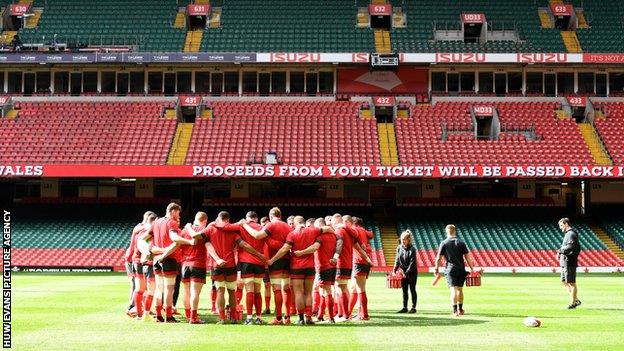Welsh Rugby Union issues finance warning after posting £5.3m loss
- Published

Wales game against Scotland scheduled for 14 March 2020 was postponed because of coronavirus
The Welsh Rugby Union (WRU) has announced a loss of £5.3m in its annual report, which it says is a result of the Covid-19 pandemic.
WRU turnover in 2019-20 was £79.9m, down from £90m in the previous year.
The report covers the year ending 30 June, 2020 and interim chief executive Steve Phillips saying the pandemic's full impact is not yet known.
There could be £35m income loss if all autumn and 2021 Six Nations matches are played behind closed doors.
"We have robust banking facilities but 2020-21 is when the full impact of this pandemic could be felt," said Phillips.
The report reveals the cost of postponing the 2020 Six Nations clash with Scotland at the Principality Stadium in March.
It outlines 78% of income is derived from staging Wales international matches and related commercial activities.
The Scotland postponement amounted to a £8.1m match income deficit and the loss was also influenced by other postponements such as Judgement Day and a Rammstein concert.
"We expected to show a break-even result for the current year and were on track to achieve this up until the business and economic disruption caused by the pandemic," said former WRU finance director Phillips.
"Its impact has meant an unanticipated loss, but we expect to be able to retain profits over the medium term to offset this loss and return net assets to previous levels.
"The group has a healthy business, with strong balance sheet and adequate liquidity, and immediate measures were taken to reduce costs and protect our financial position.
"We can be proud of what we have achieved so far and, under present circumstances, only making a £5.3m loss can be viewed positively.
"There is hard work ahead as we navigate uncertainties arising from the current pandemic."
Principality Stadium was transformed into a field hospital in 2020
The Principality Stadium will not be in action until 2021 after being used as a field hospital.
Wales play their rearranged Six Nations match against Scotland behind closed doors at Parc y Scarlets on 31 October, with the same ground hosting the Autumn Nations Cup match against Georgia.
Venues for the home match against England on 28 November and play-off game seven days later have not been confirmed while hopes of playing in front of crowds in London are dwindling.
That could mean an income loss of between £19m and £21m.
Phillips says if the original autumn programme against New Zealand, South Africa, Argentina and Fiji had gone ahead it would have created revenue of around £30m-35m.
The financial benefits of the new Autumn Nations Cup in the revised replacement 2020 international programme will not nearly match those figures.
"It is too early to quantify the impact of the pandemic on future financial performance," said Phillips, who replaced namesake Martyn as chief executive in September 2020.
"We are delighted international rugby will return this autumn but the prospect of playing without spectators has an obvious and directly negative influence on ability to generate revenue.
"We have contingency plans in place, for example the prospect of home matches in the 2021 Six Nations having to be played in front of part capacity crowds due to social distancing, but no crowds will present severe challenges."
Move the 2021 Six Nations?
The idea of delaying the Six Nations has been mooted, with Wales hosting England and Ireland in February and March. Having no crowds for those matches could cost the WRU up to £14m.
Steve Phillips has recently represented the WRU in discussions with CVC over their investment in the Pro14 competition
"Given where we are, nothing should be taken for granted and it would be remiss not to look at everything," said Phillips.
"Could we look at moving the Six Nations? Absolutely. It is not an active work stream but there are conversations going on.
"If we were not able to have crowds in the Six Nations we would probably lose between £12m and £14m.
"If you look at simple maths, the Six Nations as a whole, the combined revenue for all the six countries has to be between £75m and £100m."
There was an operating loss of £12m but the WRU benefited from £4.9m income from private equity company CVC Capital Partners' investment in the Pro14 competition in May 2020. That sum is part of the £30m Welsh rugby will receive over a five-year period.
The WRU also reduced staff salaries, including a 25% pay cut for the executive team and 10% for other staff, and used the UK government furlough scheme.
Overall investment in rugby reduced from £49.6m to £47.5m because of the early finish of the 2019-20 domestic season, but the WRU says community rugby funding increased to £4.6m from £4.5m in 2019.
Welsh Rugby Union chief executive Martyn Phillips and chairman Gareth Davies will both leave their roles in 2020
The WRU also says it provided an extra £1m as emergency funds to assist with rebuilding after Storm Dennis and dealing with the Covid-19 issue.
Phillips says he does not expect community competitive contact rugby matches to start before 2021.
Competition income was down from £11.9m to £7.1m. The allocation to the three regions not within the group - Cardiff Blues, Ospreys and Scarlets - was down from £25.4m to £25m.
Total allocations to the four Welsh professional domestic sides, including those to the WRU-owned Dragons, was £31.6m, down £300,000.
The WRU has negotiated a £20m bank loan on behalf of the regions, who will pay the debt back, while financial assistance from the Welsh and UK Governments is also being looked into.